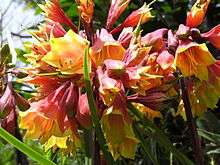Blandfordia cunninghamii
Blandfordia cunninghamii is one of four species of flowering plant commonly known as Christmas bells.[2] It is a tufted, perennial herb endemic to the Blue Mountains and Illawarra regions of eastern Australia. It has long, narrow, linear leaves and between twelve and thirty large, drooping, cylindrical to bell-shaped red flowers with yellow tips.
| Christmas bells | |
|---|---|
 | |
| Flowers near Blackheath | |
| Scientific classification | |
| Kingdom: | Plantae |
| Clade: | Tracheophytes |
| Clade: | Angiosperms |
| Clade: | Monocots |
| Order: | Asparagales |
| Family: | Blandfordiaceae |
| Genus: | Blandfordia |
| Species: | B. cunninghamii |
| Binomial name | |
| Blandfordia cunninghamii | |
| Synonyms[1] | |
Description
Blandfordia cunninghamii is a tufted perennial herb with flat , grass-like leaves up to 100 cm (39 in) long and mostly 7–12 mm (0.28–0.47 in) wide, sometimes with small teeth. The flowering stems is unbranched, up to 80 cm (31 in) long and 10 mm (0.39 in) wide with between twelve and thirty flowers, each on a pedicel up to 45 mm (1.8 in) long with a bract about the same length near its base. The three sepals and three petals are fused to form a cylindrical flower usually 30–60 mm (1.2–2.4 in) long and 20–30 mm (0.79–1.2 in) wide at the end. The flower tube is narrower for about one-third of its length before suddenly expanding to a bell-shaped tip. The tip has six pointed lobes up to 12 mm (0.47 in) long. The flower is usually red with yellow lobes. The stamens are attached to the inside wall of the flower tube, just below its middle. Flowering occurs in summer and is followed by the fruit which is a capsule about 90 mm (3.5 in) long on a stalk up to 40 mm (1.6 in) long.[2]
Taxonomy and naming
Blandfordia cunningamii was first formally described in 1845 by John Lindley who published the description in Edwards's Botanical Register.[3][4]
Distribution and habitat
This species of Christmas bells grows in damp, shallow soil, often near cliffs. It is only found in the Blue Mountains and on Mount Kembla in the Illawarra region of New South Wales. Flowering appears to be indirectly stimulated by rainfall in September and by bushfire the previous summer.[2][5][6]
References
- "Blandfordia cunninghamii". World Checklist of Selected Plant Families (WCSP). Royal Botanic Gardens, Kew.
- Quirico, Anna-Louise. "Blandfordia cunninghamii". Royal Botanic Garden Sydney. Retrieved 19 January 2019.
- "Blandfordia cunninghamii". APNI. Retrieved 20 January 2019.
- Lindley, John (1845). "Blandfordia marginata". Edwards's Botanical Register. 31: Pl. 18. Retrieved 20 January 2019.
- Coleby, David (2006). "The natural distribution and ecology of Blandfordia cunninghamii (Blandfordiaceae)". Cunninghamia. 9 (4): 537–544. Retrieved 20 January 2019.
- Coleby, David (2014). "Further observations on ecology of Blandfordia cunninghamii: flowering responses to rainfall and fire, and juvenile growth rates" (PDF). Cunninghamia. 14: 55–61. doi:10.7751/cunninghamia.2014.14.003.
| Wikimedia Commons has media related to Blandfordia cunninghamii. |